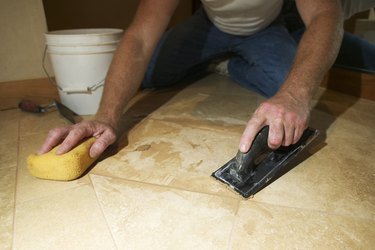Things You'll Need
Fan
Rubber gloves
Mastic remover
Sponges
Spray bottle
Rags
Plastic putty knife
Towel

Applying tile can be messy business. Lay too much mastic and it can creep up over the edge of the tiles and leave a thick, clinging mess behind. The fresher the mastic is, the easier it is to clean from the tile. That's why when professionals do a job, they keep a rag with them to immediately wipe up any mistakes. But even professionals can miss a spot or two or leave residue behind. And with minimal effort, you can clean excess mastic and have your tile looking like new in no time.
Step 1
Wait for the mastic underneath newly-installed tile floors to cure. Most mastic requires at least 72 hours after installation to harden enough to support foot traffic. For the cure time for the mastic underneath your tile, consult the mastic's label or consult the installation company.
Video of the Day
Step 2
Open the windows in the room you're working in and place a fan near the door. Most mastic removers emit noxious odors. If you have a lot of mastic to remove, put on a dust mask.
Step 3
Pour a cup of mastic remover into a separate container. Moisten a sponge with the mastic remover and saturate the surface of the mastic with the sponge. If you don't want to remove the mastic on the floor or underneath the tile, cover it with plastic. Simply cut off a flat section of a plastic bag to cover small areas. If you're removing a large area of mastic, say from the bottom of a removed tile, apply the mastic remover with a spray bottle.
Step 4
Leave the mastic remover on the mastic until it turns to liquid. Check on the mastic once every five minutes. If it dries out, apply more mastic remover.
Step 5
Wipe the liquefied mastic off with a dry rag or a plastic putty knife if the mastic layer is thick. If all of the mastic doesn't come off, repeat steps three and four.
Step 6
Moisten a fresh sponge with water and wipe all traces of the mastic remover away. Follow with a dry towel wipe.
Tip
Test the mastic remover on a scrap piece of tile (or an inconspicuous spot on the laid tile) before using it on the mastic. It may damage the finish on the tile. If it does, consider switching to a gentler, citric acid (delemonene) based mastic remore. It may take more time to remove the mastic but it will be gentler on the tile.
Video of the Day